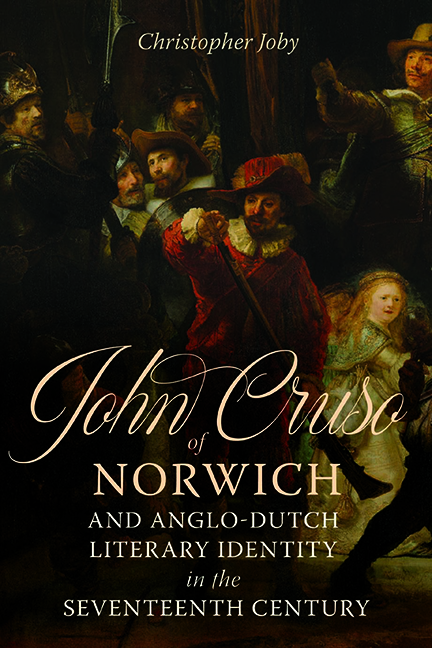Book contents
- Frontmatter
- Dedication
- Contents
- List of illustrations
- Acknowledgements
- Author’s note
- Abbreviations
- Prologue
- 1 Intrat John Cruso
- 2 John Cruso’s school days
- 3 John Cruso’s early adult life
- 4 Cruso’s elegy to Simeon Ruytinck (1622)
- 5 Cruso the English poet
- 6 1632 – Cruso’s annus mirabilis
- 7 Cruso the translator
- 8 Cruso’s 1642 Dutch verses: praise and lamentation
- 9 Cruso and the English Civil Wars
- 10 Cruso the Epigrammatist
- 11 Cruso’s final years
- Epilogue
- Appendix 1 Poems by John Cruso
- Appendix 2 Liminary verses in John Cruso’s English publications
- Bibliography
- Index
- Studies in Renaissance Literature
2 - John Cruso’s school days
Published online by Cambridge University Press: 26 May 2022
- Frontmatter
- Dedication
- Contents
- List of illustrations
- Acknowledgements
- Author’s note
- Abbreviations
- Prologue
- 1 Intrat John Cruso
- 2 John Cruso’s school days
- 3 John Cruso’s early adult life
- 4 Cruso’s elegy to Simeon Ruytinck (1622)
- 5 Cruso the English poet
- 6 1632 – Cruso’s annus mirabilis
- 7 Cruso the translator
- 8 Cruso’s 1642 Dutch verses: praise and lamentation
- 9 Cruso and the English Civil Wars
- 10 Cruso the Epigrammatist
- 11 Cruso’s final years
- Epilogue
- Appendix 1 Poems by John Cruso
- Appendix 2 Liminary verses in John Cruso’s English publications
- Bibliography
- Index
- Studies in Renaissance Literature
Summary
John Cruso's verse and prose are the work of a man fully conversant with the canon of ancient Greek and Latin literature and key works of Renaissance literature such as those of Erasmus and Thomas More. No record of him attending university has, however, come to light, which begs the question of how he became so familiar with this literature. The short answer is that he most likely attended grammar school, where pupils learnt Latin, and in some cases Greek, and imbibed the literary canon.
Early modern Norwich had quite a thriving ‘market’ in education for boys and, to a lesser extent, girls in the Dutch and Walloon Stranger communities, and the English community. If, as this chapter argues, John Cruso did attend grammar school, then it was most probably Norwich Free Grammar School, which was run by the city corporation. We still have the 1566 Ordinances for the school which set out matters such as how pupils would make progress in Latin and which texts they should study. This gives us an excellent insight into the texts that the young Cruso studied, and which he would later re-work in his own prose and verse.
EDUCATION IN EARLY MODERN NORWICH
In the early days of the Norwich Dutch community there were several schoolmasters to whom children in that community could go for tuition. Among these was Jan Ruytinck. As well as working as a notary in Norwich, he taught French to local English children and boarders from Flanders. The physician Matthias de Rijcke offered tuition in Latin. One of his pupils, Janus Gruter, would go on to study at Cambridge and Leiden, later becoming Professor of History at Heidelberg. Gruter published Neo-Latin verse and works of history such as Inscriptiones antiquae totius orbis Romani [Ancient Inscriptions of the entire Roman world] (Heidelberg, 1602–3). He also wrote many Dutch sonnets, with one contemporary putting the number as high as 500. In going to Cambridge, Gruter was something of an exception among the sons of the first generation of Dutch Strangers in Norwich. Several of them studied instead at Leiden. Jan Ruytinck's son, Simeon, studied classics and divinity at Leiden between 1594 and 1599.
- Type
- Chapter
- Information
- Publisher: Boydell & BrewerPrint publication year: 2022



